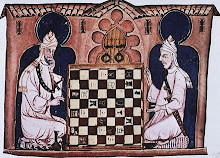Chess became part of my life during the Fischer-Spassky World Championship in 1972. That summer I was camping with my parents and sisters in a VW bus traveling around the cheap places of Europe. I don't remember how I learned the game, but I followed the descriptive notation of every game. My older sister and I played chess and fought over rules so much that we quit playing each other. Bobby beat the Russians. I wanted to beat my older sister.
After that my chess education consisted of reading about it in the encyclopedia Britannica. I remember it included a game between Bobby Fischer and Mikhail Tal. It was a French Winauer poisoned pawn. I was amazed how quickly and accidentally I memorized that game. I think it was because of the direct forcefulness and logic of every move. I felt pretty special and wondered if I had something.
When I was in high school my sister brought a boyfriend home that I did not like. He seemed way too full of himself. When he said that he played chess my sister sent him my way. I beat him rather convincingly. And I think that is what really hooked me. I thought I was good at chess.
I jumped the backyard fences and slipped down the hill to our public library. There I found a book on elementary tactics. It was enough to give me a head start on other kids. I didn't play much. But when I did I won. But I had no idea about how hard chess really was and how tough the competition could be.
During college I worked during summers at a camp. I played all the chess I could. I met my first tough chess players there. First there was a Russian named Max. I remember he took so long to move. He beat me tactically and positionally. From Max I learned that it is okay to take time to think, that Rooks, even behind a Bishop and Pawn can suddenly become active, and that pawns go on the opposite color of the Bishop for maximum mobility. He crushed me, yet encouraged me regarding my choices so I still had some pride and hope.
The second tough chess player was a paralyzed young man named Alfonso. I visited him at the state children's hospital because someone made me promise I would go see him. I was afraid. The place was dark, depressing, and smelled of urine. Alfonso turned out to be both cheerful as a human being, and a much better chess player than me. I would move, then I would move his pieces where he told me to put them. Alfonso showed me the Bh7+ Greek gift sacrifice. And in the following game demonstrated that while I was slowly weaving a net around his knight, he was building up for yet another sacrificial destruction of my castled King's cover. Alfonso taught me how dangerous Chess could suddenly be.
I suppose I could have lost hope except for all the other pick up skittles games I was winning. Apart from Max and Alphonso I won every game against ordinary unstudied players except one. And I still kick myself for doing it. Black had Bb7 and Qc6, I had Nf3 and Bg2 and played Ne5?? or something like that, foolishly thinking about uncovering the Bishop on the queen. Of course he played Qg2#. It shows a bad habit that comes from playing against planless easy opposition. I was so far ahead that I ignored that he might have a good move.
Savielly Tartakower is still right. "The blunders are all there on the board, waiting to be made."
Chess is a love-hate relationship.
Monday, April 6, 2009
Subscribe to:
Post Comments (Atom)

No comments:
Post a Comment